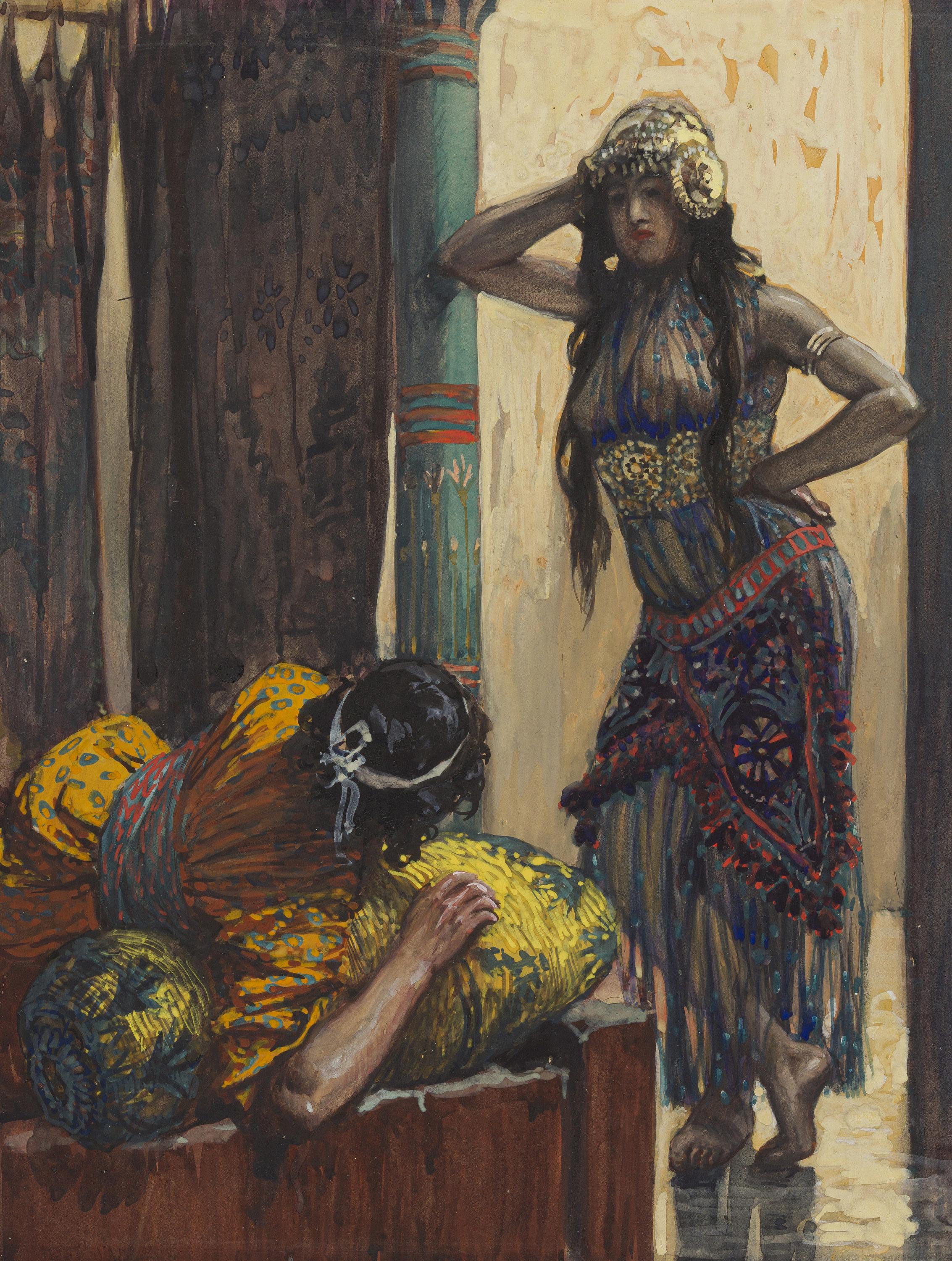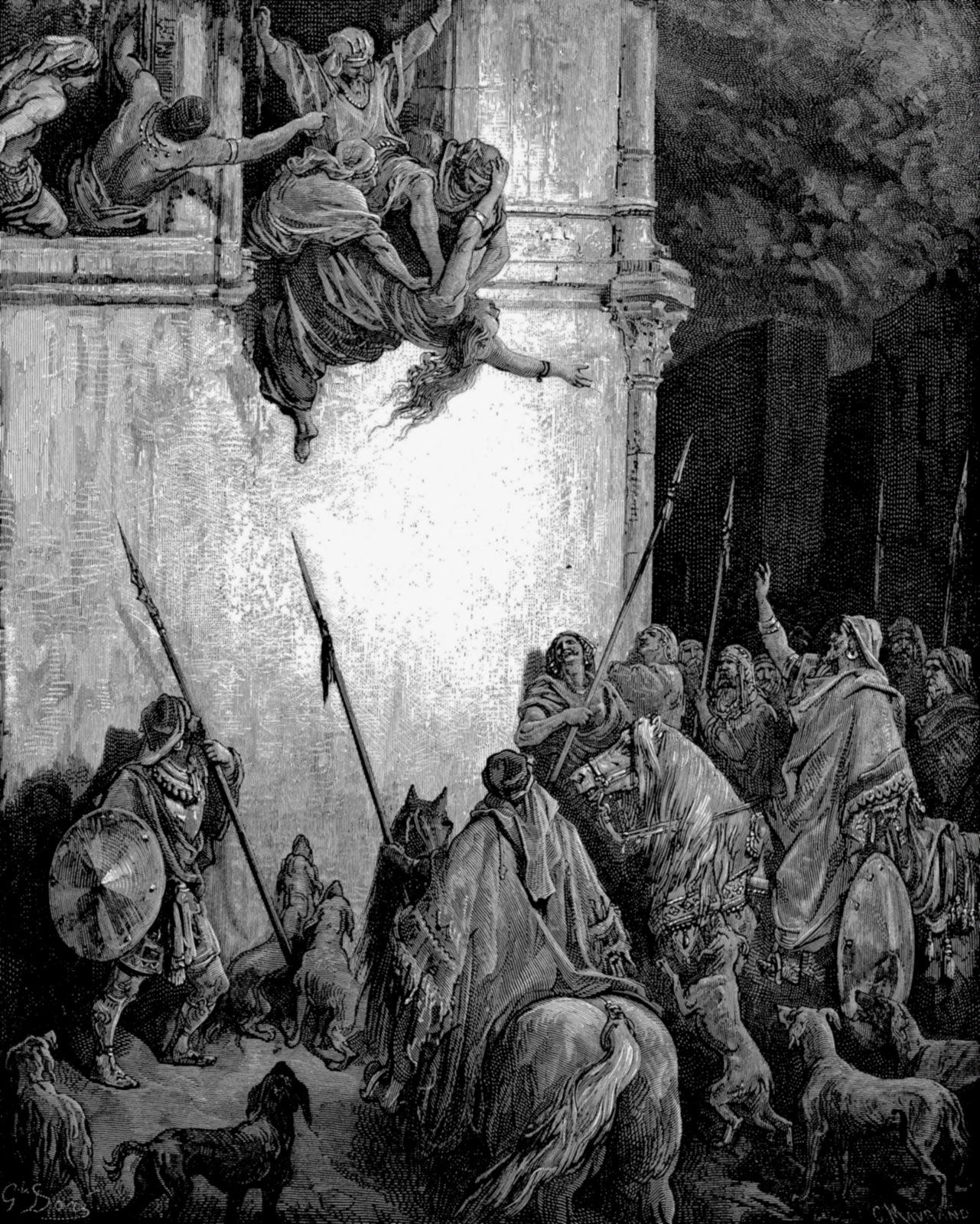Jezebel, the wife of King Ahab, is a controversial figure in biblical history. She is known for her manipulation and seduction of the saints of God, leading them into sins of idolatry and sexual immorality. Jezebel’s reign was marked by controversy and conflict, ultimately leading to her death.
Jezebel’s death is recorded in the Bible in the book of Kings. According to the text, after King Ahab’s death, his son Jehoram succeeded him as king of Israel. However, Jehoram was killed by Jehu, a new contender for the throne. Jezebel, who was still alive at the time, was also targeted by Jehu.
As Jehu approached the Jezreel palace where Jezebel was staying, she regally awaited her doom. However, some palace officials dropped her through a lattice window, causing her to fall to her death. Jehu then ordered her body to be eaten by dogs, fulfilling a prophecy that had been made aout her earlier.
Jezebel’s death is significant for several reasons. Firstly, it marks the end of her controversial reign as queen of Israel. Secondly, it represents the fulfillment of a prophecy that had been made about her earlier. it serves as a warning to those who would follow in Jezebel’s footsteps and lead others astray.
The story of Jezebel’s death is a fascinating and controversial part of biblical history. Although her reign was marked by controversy and conflict, her death serves as a warning to those who would lead others astray.
The Fate of Jezebel: Who is Responsible?
Jezebel, the wife of King Ahab and a prominent figure in the Old Testament, is killed by Jehu. Jehu was a military commander who was anointed king of Israel by a prophet named Elisha. He led a rebellion against the ruling dynasty of Ahab and Jezebel, who were known for their worship of the pagan god Baal and their persecution of the prophets of the God of Israel.
According to the biblical account in 2 Kings 9, Jehu rode into the city of Jezreel and killed both Jehoram, the son of Ahab and Jezebel, and Ahaziah, the king of Judah who was visiting him. When Jezebel heard of this, she put on her royal robes and adorned herself to meet Jehu. However, Jehu had her thrown out of a window, and she was trampled underfoot by horses.
Jezebel’s death is seen as a fulfillment of the prophecy givn by Elijah, who had warned Ahab that his family would be destroyed because of their idolatry and wickedness. Jehu’s actions are also seen as a judgment against Jezebel’s influence and her persecution of the prophets of the God of Israel.
Jezebel is killed by Jehu, a military commander who was anointed king of Israel by the prophet Elisha, in fulfillment of the prophecy given by Elijah.

Source: jwa.org
The Death of Jezebel in the Bible
Jezebel was a prominent figure in the Bible, known for being the wife of King Ahab, who ruled over the kingdom of Israel. According to the books of Kings in the Bible, Jezebel’s death is estimated to have occurred around 843 BCE.
Although the exact date of her death is not mentioned in the Bible, it is believed to have been sometime durig the reign of Jehu, who was a commander in the Israelite army and eventually became king after overthrowing the previous rulers.
Jezebel’s death is described in the Bible as a violent one, with Jehu ordering her to be thrown out of a window and trampled by horses. This was seen as a punishment for her role in promoting the worship of foreign gods and leading Israel away from the worship of Yahweh, the God of the Israelites.
Jezebel’s legacy in the Bible is a controversial one, with some viewing her as a powerful and influential queen, while others condemn her for her actions and beliefs. Regardless, her story continues to be studied and analyzed by scholars and religious leaders alike.
The Sin of Jezebel
Jezebel was a queen in the Bible who is often associated with sin and wickedness. Throughout history, her name has become synonymous with evil deeds. According to the Bible, Jezebel’s sin was her manipulation and seduction of the saints of God, leading them into sins of idolatry and sexual immorality. Her actions were seen as a direct attack on God and his people.
Jezebel was the wife of King Ahab, who was a ruler in Israel during the 9th century BC. She was a worshipper of the pagan god Baal and was known for her harsh treatment of the prophets of God. She sought to destroy the worship of God and replace it with the worship of Baal.
Jezebel’s most infamous sin was her role in the murder of Naboth, a man who owned a vineyard near the royal palace. When Naboth refused to sell his land to King Ahab, Jezebel plotted to have him falsely accused and executed so that the king could take possession of the vineyard.
But Jezebel’s sins did not end there. She also encouraged King Ahab to engage in sexual immorality and to worship idols. She used her beauty, charm, and power to manipulate tose around her and to lead them astray.
In particular, Christians associated Jezebel with promiscuity. The cosmetics which Jezebel applied before her death also led some Christians to associate makeup with vice. However, it’s important to note that these associations are based on interpretation and are not necessarily accurate.
Jezebel’s sin was her rebellion against God and her efforts to lead others away from him. Her actions were seen as a serious offense and a warning to others not to follow in her footsteps.
The Tragic Fate of Jezebel: Eaten by Dogs
Jezebel, the queen of Israel, was eaten by dogs as a result of her efforts to introduce pagan worship to the kingdom where the Hebrew God, Yahweh, was the only deity. Jezebel’s actions were met with resistance from Elijah, Yahweh’s prophet, who saw her as a threat to the worship of the true God. The conflict between Jezebel and Elijah came to a head when Jezebel ordered the execution of Yahweh’s prophets, leading Elijah to challenge her and call down fire from heaven to prove Yahweh’s power.
Despite this display of divine power, Jezebel continued to resist and promote her pagan beliefs, leading to her downfall. According to the biblical account, Jezebel was thrown from a high window and left unattended, which allowed dogs to consume her body, fulfilling Elijah’s prophecy that “the dogs shall eat Jezebel by the wall of Jezreel” (2 Kings 9:36).
The image of Jezebel beng eaten by dogs has become a symbol of divine retribution for those who oppose the worship of Yahweh and has been used in a variety of contexts throughout history. It serves as a warning to those who would seek to promote their own beliefs at the expense of the true God, as well as a reminder of the power of prophecy to predict and fulfill events.
The Meaning of Being Called Jezebel
To be called Jezebel is oftn considered an insulting and derogatory term, particularly when directed towards a woman. The term originates from the Biblical character Queen Jezebel, who was known for her wickedness and immorality.
In modern times, the term Jezebel is used to describe a woman who is impudent, shameless, or morally unrestrained. It implies that the woman is promiscuous and lacks modesty, and may also suggest that she is manipulative or deceitful.
While the term may be used as a way to shame and belittle women, it is important to note that its use is often rooted in sexism and misogyny. Women who are confident, assertive, and unapologetic in their behavior may be unfairly labeled as “Jezebels” as a way to undermine their authority and independence.
It is crucial to recognize the harmful implications of using such language and to challenge the societal norms that perpetuate these harmful stereotypes. By promoting gender equality and rejecting harmful labels, we can work towards creating a more inclusive and respectful society.

Source: britannica.com
The Death of Jezebel After Ahab
Jezebel did die after Ahab. According to the Bible, Jezebel’s death was more dramatic than Ahab’s. It is recorded in 2 Kings 9:30-34 that Jehu had her servants throw Jezebel out of a window, causing her death. The dogs ate Jezebel’s body, leaving nothing but her skull, her feet, and the palms of her hands, as prophesied by Elijah. This incident marks the end of Jezebel’s life and her reign of terror over Israel.
What Does the Bible Say About Women Losing Their Hair?
The Bible mentions the idea of women losing their hair in Isaiah 3:17. In this passage, the Lord is said to have put sores on the heads of women in Jerusalem and caused them to lose their hair. This passage may be interpreted as a form of punishment or judgment against these women.
It’s important to note that this passage is just one instance in the Bible where hair loss is mentioned. In other parts of the Bible, hair is seen as a symbol of strength and beauty, and women are often praised for their long, flowing locks.
In the New Testament, the apostle Paul writes about hair in his first letter to the Corinthians. He says that a woman’s long hair is a symbol of her submissiveness to God and to her husband. He also notes that it is shameful for a man to have long hair.
While the Bible does mention hair loss in certain contexts, it does not prvide a comprehensive teaching on the subject. It’s important to keep in mind the cultural and historical context of these passages and to approach them with a nuanced understanding.
The Consequences of Jezebel’s Facial Alterations
According to the Old Testament (1 Kings), Jezebel, the Phoenician princess and Queen of Ancient Israel, is said to have fixed her hair and painted her face before her death. It is not explicitly stated what exctly she did to her face, but it can be assumed that she applied some form of makeup or facial paint.
In ancient times, makeup was commonly used by women to enhance their beauty and social status. The use of cosmetics was also associated with religious and cultural practices. Women would use natural substances such as henna, kohl, and crushed minerals to create different effects on their skin, hair, and nails.
It is possible that Jezebel, being a queen and a woman of high status, would have used makeup regularly as part of her grooming routine. However, in this particular instance, it is suggested that she may have applied makeup as a final act of defiance or as a way to maintain her dignity in the face of her impending death.
While the exact details of what Jezebel did to her face are unknown, it is likely that she applied some form of makeup or facial paint before her death. The use of cosmetics in ancient times was common among women of high status, and it is possible that Jezebel used makeup regularly as part of her grooming routine.
Conclusion
Jezebel died a violent death, as prophesied by Elijah, due to her wickedness and idolatry. After her husband’s death, she continued to exercise power and influence, which led to her confrontation with Jehu, who was determined to rid Israel of the Baal worship that Jezebel had promoted. Jezebel was thrown from a window by her own servants and trampled to death by horses, fulfilling Elijah’s prophecy (2 Kings 9:30-37). Her death was a symbol of the downfall of the house of Ahab and the destruction of the Baal worship that had corrupted Israel. Jezebel’s legacy lives on as a warning againt the dangers of idolatry, seduction, and manipulation.
